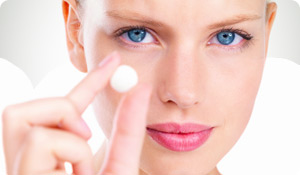
According to the National Library of Medicine (NLM), defining what is a "lifestyle drug" actually is a subject of much debate. However, according to the NLM it's typically thought of as a drug taken to satisfy a non-medical or non-health-related goal. This includes drugs that address cosmetic issues like baldness and wrinkles, erectile dysfunction, and weight loss aides.
The benefits of lifestyle drugs can include improved appearance, help with weight loss, a boost in self-image and self-esteem, and a fix to embarrassing sexual complications. Lifestyle drugs, such as Viagra® and Botox®, are advertised almost everywhere and make up a nearly $30 billion dollar industry. While these remedies may seem more benign than conventional medications, it's important to examine both the pros and the cons:
1. Antidepressants are the most commonly used lifestyle drug on the market. According to the Centers for Disease Control and Prevention (CDC), of the 2.4 billion drugs prescribed in 2005, 118 million were for antidepressants.
Pros: Antidepressants can help correct chemical imbalances in individuals who suffer from depression, bipolar disorder, and other mental health conditions.
Cons: Antidepressants, in combination with other medications, can cause adverse reactions, or drug-drug interactions. These medicine interactions can be as mild as insomnia or dizziness, or, can be serious—although that is rare Additionally, taking certain antidepressants can result in high risk pregnancies that can put mother and child at risk.
2. Erectile dysfunction (ED) remedies are some of the most frequently advertised lifestyle drugs. The National Institutes of Health (NIH) estimates that ED affects as many as 30 million men in the United States-most of which utilize some form of ED treatment.
Pros: Aside from reestablishing normal sexual functioning in men with ED, these medications can boost a man's confidence and restore intimacy in healthy relationships.
Cons: According to a report published in the Annals of Internal Medicine, analysis of insurance records of more than 1.4 million U.S. men over 40 found that those who used ED drugs were more likely to have sexually transmitted diseases (STDs) than those who did not. For those who take testosterone to treat ED, liver problems can also occur.
3. Botulinum toxin type A, onabotulinumtoxinA, or Botox®, is an elective procedure that treats wrinkles through injection. Almost 9.5 million cosmetic surgical and nonsurgical procedures were performed in the United States in 2010. The most popular nonsurgical procedure was injections of Botulinum toxin type A.
Pros: Not only has Botox® been proven to eliminate unsightly wrinkles, crow's feet, and bags, but some studies suggest it can alleviate migraines and pain related to fibromyalgia.
Cons: Many individuals who under go the procedure complain of headaches and pain at the site of the injection. In rare cases, Botulinum toxin type A has caused drooping eyelids and eyebrows and facial paralysis.
4. Whether they're over-the-counter remedies, elective procedures, or medications prescribed by a physician, hair treatments used to regrow hair or prevent the onset of graying hair are popular among men and women alike.
Pros: Restoring the locks you flaunted during your youth can boost confidence, self-image, and self-esteem. What's more, most hair treatments have been shown to be relatively effective.
Cons: A recent report found that an upcoming pill that prevents gray hair can actually change a person's eye color. However, this side effect is relatively innocuous compared to the headaches and itchiness that is often associated with hair transplants.
5. The appeal of weight loss aides makes them one of the most commonly used lifestyle drugs by women.
Pros: Some weight loss aides can have a marked effect on the user. This can result in raised self-esteem and confidence, lowered risk of heart disease and type 2 diabetes, and can help spawn a healthier lifestyle.
Cons: Many people who take them become addicted because losing weight with these aides are easy, and almost effortless. Overuse of such drugs can drastically affect an individual's metabolism. Additionally, many users report issues related to high blood pressure, insomnia, excessive thirst, anxiety, and constipation.
Considering Using a Lifestyle Drug?
If you are, do so responsibly. This means:
- Tell your physician about all prescription and non-prescription medications you are taking. This includes vitamins and supplements. Non-prescription substances can also cause harmful interactions when mixed with prescription drugs.
- Use one pharmacy to fill your prescriptions. Your pharmacist may notice potentially harmful combinations and can bring them to your attention.
- Listen to your body. If you notice any side effects or changes in the way you feel, tell your physician right away.
- Take an active role in your own care.
Sources:
The National Library of Medicine
Lifestyle drugs: pharmacology and the social agenda.
http://www.ncbi.nlm.nih.gov/pubmed/15063081
MSNBC
Kimberly Hayes Taylor
Pill to stop gray hair could pose risks, doctors caution
http://www.msnbc.msn.com/id/44776450/ns/health-aging/t/pill-stop-gray-hair-could-pose-risks-doctors-caution/#.TsxQbnG01ro
National Institutes of Health (NIH) Consensus Conference. NIH Consensus Development Panel on Impotence. Impotence. Journal of the American Medical Association. 1993;270:83-90.





